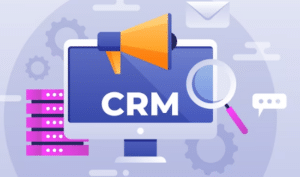blog.hargaticket.com – The Power and Potential of CRM Software, In the contemporary business landscape, where success hinges on understanding and nurturing customer relationships, Customer Relationship Management (CRM) software has emerged as a game-changing tool. No longer confined to simple contact management, CRM software has evolved into a dynamic platform that empowers organizations to revolutionize their interactions, elevate customer experiences, and drive sustainable growth. This article delves into the profound impact of CRM software, exploring its capabilities, benefits, and potential to reshape business relationships in the modern age.
The Evolution of CRM Software
Defining CRM Software
CRM software refers to a suite of applications designed to streamline, automate, and enhance customer-related processes and interactions. It centralizes customer data, facilitates communication, and provides actionable insights to help businesses effectively manage relationships throughout the entire customer lifecycle.

From Contact Management to Relationship Building
Historically, CRM software was associated with basic contact management—storing customer names, phone numbers, and addresses. However, as technology advanced and customer expectations evolved, CRM software transformed into a comprehensive solution for cultivating meaningful relationships. It now encompasses sales automation, marketing automation, customer service management, and advanced analytics.
The Power of CRM Software
Unified Customer Data
CRM software serves as a centralized repository for customer data, consolidating information from various touchpoints and interactions. This unified view enables businesses to gain deep insights into customer behaviors, preferences, purchase history, and communication history.
Personalization at Scale
One of the most transformative aspects of CRM software is its ability to enable personalization at scale. By harnessing customer data, organizations can tailor communications, offers, and experiences to meet individual preferences. This level of personalization enhances engagement and fosters loyalty.
Enhanced Communication
CRM software facilitates seamless communication among different teams within an organization. Sales, marketing, and customer service teams can access shared customer profiles and collaborate effectively to provide consistent and personalized interactions.
Automation and Efficiency
Automation is a hallmark of CRM software. Repetitive tasks such as data entry, lead nurturing, and follow-up communications can be automated, allowing teams to focus on higher-value activities. This automation leads to improved efficiency and productivity.
Benefits of CRM Software Adoption
Improved Customer Insights
CRM software provides a 360-degree view of customers, enabling businesses to understand their needs, preferences, and pain points. These insights guide decision-making and help tailor offerings to customer expectations.
Enhanced Customer Service
Prompt and personalized customer service is a cornerstone of CRM software. Customer inquiries and issues can be tracked, prioritized, and resolved efficiently, leading to increased customer satisfaction.
Streamlined Sales Processes
CRM software optimizes sales processes, from lead generation to closing deals. Lead scoring, automated follow-ups, and sales pipeline management streamline workflows and improve conversion rates.
Targeted Marketing Campaigns
With CRM software, marketing efforts become more targeted and effective. Customer segmentation allows for precise targeting, while automation ensures that the right message reaches the right audience at the right time.
Industry Applications of CRM Software
Retail and E-commerce
In the retail and e-commerce sectors, CRM software enables businesses to create personalized shopping experiences. Customer purchase history, browsing behavior, and preferences can be leveraged to recommend products, offer discounts, and drive repeat business.
Financial Services
For financial institutions, CRM software facilitates personalized financial advice, investment recommendations, and efficient account management. It enhances customer loyalty by providing tailored financial solutions based on individual goals.
Healthcare
In healthcare, CRM software helps manage patient interactions, appointments, and medical records. It ensures timely follow-ups, personalized care plans, and efficient coordination among medical professionals.
Overcoming Challenges and Considerations
Data Privacy and Security
As CRM software deals with sensitive customer data, ensuring data privacy and security is paramount. Organizations must comply with data protection regulations and implement robust security measures to safeguard customer information.
Integration and User Adoption
Integrating CRM software with existing systems and ensuring user adoption can be challenging. Proper training and change management strategies are essential to maximize the software’s benefits.
Case Studies
Case Study 1: Salesforce’s Dominance
Salesforce, a leading CRM software provider, has transformed businesses with its comprehensive platform. Companies like Airbnb and Adidas use Salesforce to unify customer data, streamline processes, and deliver personalized experiences at scale.
Case Study 2: HubSpot’s Growth Engine
HubSpot’s CRM software has enabled businesses to attract, engage, and delight customers. Its inbound marketing approach, coupled with CRM capabilities, has empowered companies like The New York Times and SurveyMonkey to enhance customer engagement and drive growth.
Future Trends in CRM Software
AI and Predictive Analytics
The integration of artificial intelligence (AI) and predictive analytics will amplify CRM software’s capabilities. AI-driven insights will enable businesses to anticipate customer behavior, identify trends, and make data-driven decisions.
Voice and Conversational Interfaces
Voice technology and conversational interfaces are set to transform CRM interactions. Customers will interact with CRM systems through voice-activated devices and chatbots, enhancing convenience and engagement.
Conclusion
In an era defined by customer empowerment and digital transformation, CRM software has emerged as a transformative force that empowers organizations to build meaningful relationships, deliver exceptional experiences, and drive growth. From unifying customer data to enabling personalization at scale, CRM software empowers businesses to connect with customers in profound ways. Its benefits span industries, revolutionizing processes across retail, finance, healthcare, and beyond.
While challenges such as data privacy and integration persist, the potential of CRM software to reshape business relationships is undeniable. As the technology continues to evolve and new trends like AI and conversational interfaces emerge, the power and potential of CRM software in the modern age remain boundless. Organizations that harness this power stand poised to thrive in a customer-centric world, where strong relationships are the foundation of lasting success.